whendoing的用法.doc
when doing sth的用法

when doing sth的用法当人们在英语中讨论某些动作或活动时,经常使用“when doing sth”的结构。
这种用法表示在进行某项任务或活动的同时发生了另一个事件。
这个结构可以用来描述各种情况,比如做家务,锻炼,读书,吃饭等等。
本文将详细介绍“when doing sth”的用法和几个例子。
一、基本结构“when doing sth”的基本结构是when + 动名词。
例如:- When reading a book, I always make notes. - When watching a movie, I prefer to have popcorn. - When cooking dinner, I usually listen to music.这个结构可以用来描述任何我们在做某件事情的时候发生的事情。
下面是一些更多的例子:- When driving to work, I always listen to the radio. - When studying for exams, I find it helpful to quiz myself. - When shopping for clothes, I usually try on a lot of different items before I make a decision. - When hiking in the mountains, I always carry a map and compass. - When preparing apresentation, I like to practice in front of a mirror.二、when doing sth的含义“when doing sth”是一种描述同时发生的事件的语法结构。
它强调在某个时刻或某个活动进行时,另一个事件会发生。
例如,当我们正在准备晚饭时,手机会响起。
doing,todo,do的用法

一.To do形式afford to do sth. 负担得起做某事agree to do sth. 同意做某事arrange to do sth.安排做某事ask to do sth. 要求做某事beg to do sth. 请求做某事care to do sth. 想要做某事choose to do sth. 决定做某事decide to do sth. 决定做某事demand to do sth. 要求做某事expect to do sth. 期待做某事fear to do sth. 害怕做某事help to do sth. 帮助做某事hope to do sth. 希望做某事learn to do sth. 学习做某事manage to do sth. 设法做某事offer to do sth. 主动提出做某事plan to do sth. 计划做某事prepare to do sth. 准备做某事pretend to do sth. 假装做某事promise to do sth. 答应做某事refuse to do sth. 拒绝做某事want to do sth. 想要做某事wish to do sth. 希望做某事happen to do sth. 碰巧做某事struggle to do sth. 努力做某事advise sb. to do sth. 建议某人做某事allow sb. to do sth. 允许某人做某事ask sb. to do sth.请(叫)某人做某事bear sb. to do sth.忍受某人做某事beg sb. to do sth. 请求某人做某事cause sb. to do sth. 导致某人做某事command sb. to do sth. 命令某人做某事drive sb. to do sth .驱使某人做某事elect sb. to do sth. 选举某人做某事encourage sb. to do sth. 鼓励某人做某事expect sb. to do sth. 期望某人做某事forbid sb. to do sth. 禁止某人做某事force sb. to do sth. 强迫某人做某事get sb. to do sth. 使(要)某人做某事hate sb. to do sth. 讨厌某人做某事help sb. to do sth. 帮助某人做某事intend sb. to do sth. 打算要某人做某事invite sb. to do sth. 邀请某人做某事leave sb. to do sth. 留下某人做某事like sb. to do sth. 喜欢某人做某事mean sb. to do sth. 打算要某人做某事need sb. to do sth. 需要某人做某事oblige sb. to do sth. 迫使某人做某事order sb. to do sth. 命令某人做某事permit sb. to do sth. 允许某人做某事persuade sb. to do sth. 说服某人做某事prefer sb. to do sth. 宁愿某人做某事request sb. to do sth. 要求某人做某事remind sb. to do sth. 提醒某人做某事teach sb. to do sth .教某人做某事tell sb. to do sth. 告诉某人做某事train sb. to do sth. 训练某人做某事trouble sb. to do sth. 麻烦某人做某事want sb. to do sth. 想要某人做某事warn sb. to do sth. 警告某人做某事1. It’s time to do sth. 现在是做某事的时候了2. It takes sb. some time to do sth. 做某事花了某人时间3. tell/ask/want/encourage/invite/ sb. to do sth. 告诉、叫、想、鼓励、邀请某人做某事4. Would you like to do sth.? 你想做某事吗/5. It’s good/bad to do sth. 做某事好、不好6. It’s good/bad for sb.to do sth. 某人做某事好、不好7. be+adj.+enough to do sth. 足够+形容词做某事8. sb. is ready to do sth. 某人准备好做某事9. It’s+adj.+ for sb. to do sth. 做某事对某人+形容词(做这件事对你好)10. It’s+adj.+ of sb. to do sth. 某人做某事+形容词(你做这件事真好)11. would like/love /decide/want/wish/to do sth. 想、喜欢、决定、想、希望做某事12. would like/love sb. to do sth. 想、喜欢某人做某事13. Prefer to do sth. rather than do sth. 宁愿做某事而不愿做某事I prefer to stay at home rather than go out. 我宁愿呆在家里不愿出去14. how/ when/where/whether to do sth 怎么、什么时候、在哪里、要不要做某事15. can’t wait to do 迫不及待做某事16. too … to do …太怎么样而不能做某事17. be afraid /ready/able/sure to do 害怕、准备、能够、确定做某事18. seem to do 似乎做某事二doing形式advise doing sth. 建议做某事allow doing sth. 允许做某事appreciate doing sth. 感激做某事consider doing sth. 考虑做某事delay doing sth. 推迟做某事discuss doing sth. 讨论做某事dislike doing sth. 不喜欢做某事enjoy doing sth. 喜爱做某事escape doing sth. 逃脱做某事excuse doing sth. 原谅做某事finish doing sth. 完成做某事give up doing sth. 放弃做某事imagine doing sth. 想象做某事keep doing sth. 保持做某事mind doing sth. 介意做某事miss doing sth. 错过做某事permit doing sth. 允许做某事practice doing sth. 练习做某事put off doing sth. 推迟做某事report doing sth. 报告做某事risk doing sth. 冒险做某事stop doing sth. 停止做某事suggest doing sth. 建议做某事understand doing sth. 理解做某. carry on\keep doing 坚持做某事be afraid of doing 害怕做某事(sth)be worth doing 值得做be busy doing 忙于做某事how about doing//what about doing 做某事怎么样. spend some time (in)doing 花时间做某事. spend some money (in) buying 花钱做某事feel like doing 想做某事stop/keep/prevent … from doing 阻止某人做某事thank sb for doing 感谢某人做某事.thanks for doing 感谢做某事do some cooking/cleaning/reading/shopping/washing 做点饭、打扫一下卫生、读点书、逛逛街、洗洗衣服go swimming/fishing/shopping/skating/boating 去游泳、钓鱼、逛街、滑冰、划船prefer doing … to doing…比起做某事更喜欢做某事. can’t help doing 情不自禁做某事. have fun/difficulty/trouble/problem doing sth. 做某事有趣、有困难、有困难、有困难waste time/money doing 浪费时间、钱做某事instead of doing 代替做某事miss doing 错过做某事三。
when和while的用法和区别

when和while的用法和区别When 和 While 的用法和区别在英语学习中,when 和 while 是两个常见的连接词,用于引导时间状语从句。
它们在用法和含义上有一些相似之处,但也存在明显的区别。
理解并正确使用 when 和 while,对于准确表达时间和动作的关系非常重要。
首先,我们来看 when 的用法。
When 可以表示“当的时候”,它既可以指一个时间点,也可以指一段时间。
当when 表示一个时间点时,从句中的动作通常是短暂性的。
例如:“When I arrived home, my mother was cooking dinner”(当我到家时,我妈妈正在做晚饭。
)在这个句子中,“arrived”是一个短暂性动作,表示到达的瞬间。
When 也可以表示一段时间,此时从句中的动作通常是持续性的。
比如:“When I was a child, I often played in the park”(当我还是个孩子的时候,我经常在公园里玩。
)这里“was a child”是一个持续的状态。
接下来,我们探讨 while 的用法。
While 通常表示“在期间”,强调主句和从句的动作同时发生,并且两个动作都是持续性的。
例如:“While I was doing my homework, mysister was watching TV”(当我在做作业的时候,我妹妹在看电视。
)在这个句子中,“was doing”和“was watching”都是持续性的动作。
比较 when 和 while,我们可以发现以下几个主要区别。
一是动作的性质。
When 引导的从句动作既可以是短暂性的,也可以是持续性的;而 while 引导的从句动作通常是持续性的。
二是主从句动作的关系。
When 引导的从句动作可以发生在主句动作之前、之后或同时;而 while 从句中的动作通常与主句动作同时进行。
三是侧重点不同。
When 更侧重于动作的突然发生或某个具体的时间点;while 则更强调动作的同时进行和持续。
when的用法小结

when 用法小结不管是在口语中,还是在书面语中,when是一个十分活跃的词,该词主要用作连词和副词,但是在意义方面其用法比较复杂。
一、作副词1. 作疑问副词,用于构成特殊疑问句,意为“什么时候;何时”。
When will they come back?他们什么时间回来?When can you finish the work? 你什么时间能完成这项工作?2. 作连接副词,引导名词性从句,或与不定式连用,意为“什么时候”。
Can you tell me when the bank opens?你能告诉我银行什么时候开门吗?When she'll be back depends on the weather. 她何时回来取决于天气。
Have you decided when to go sightseeing?你们已经决定什么时候去郊游了吗?3. 作关系副词,引导定语从句。
The main school holidays are from mid-December till early February,when the days are long and warm. 学校的主要假期是从12 月中旬到2 月初,这段时间里白天长而且很温暖。
Do you remember the time when the three of us went on a holiday in Guilin?你还记得我们三个人在桂林度假的那段时光吗?二、作从属连词,引导状语从句。
1. 表示时间,意为“当……时;在……的时候”。
When you see him, please say hello to him. 见到他时,代我问他好。
When I reached the station,the train had left. 当我到达火车站时,火车已经开走了。
2. 表示条件,相当于if。
How can I get a job when I can't even read or write?如果我连读和写都不会,我怎么能找到工作呢?3. 表示对比,相当于whereas, while, since, 意为“既然;然而”。
ving作状语
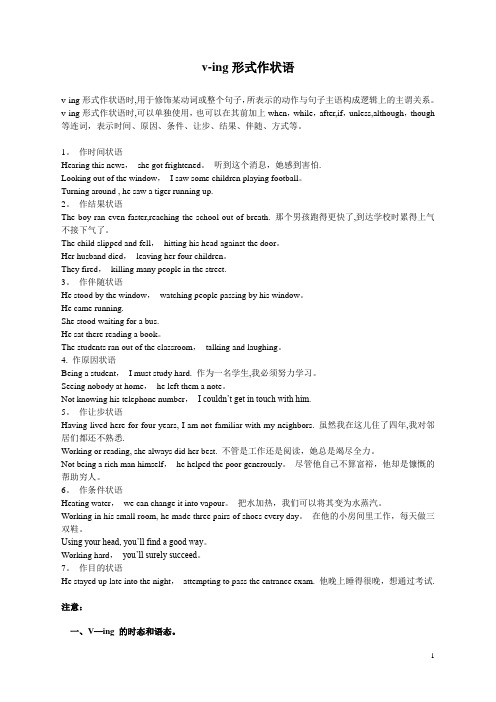
v-ing形式作状语v-ing形式作状语时,用于修饰某动词或整个句子,所表示的动作与句子主语构成逻辑上的主谓关系。
v-ing形式作状语时,可以单独使用,也可以在其前加上when,while,after,if,unless,although,though 等连词,表示时间、原因、条件、让步、结果、伴随、方式等。
1。
作时间状语Hearing this news,she got frightened。
听到这个消息,她感到害怕.Looking out of the window,I saw some children playing football。
Turning around , he saw a tiger running up.2。
作结果状语The boy ran even faster,reaching the school out of breath. 那个男孩跑得更快了,到达学校时累得上气不接下气了。
The child slipped and fell,hitting his head against the door。
Her husband died,leaving her four children。
They fired,killing many people in the street.3。
作伴随状语He stood by the window,watching people passing by his window。
He came running.She stood waiting for a bus.He sat there reading a book。
The students ran out of the classroom,talking and laughing。
4. 作原因状语Being a student,I must study hard. 作为一名学生,我必须努力学习。
doing作状语

doing作状语1.用法:动词ing作状语时,可以表示时间、原因、结果、条件、方式或伴随动作。
通常可转化成与之相对应的状语从句。
2.分类:(1)作时间状语e.g. Walking in the park, she saw an old friend.= When/While (she was) walking in the park, she saw an old friend.Having finished the work, he went to see his teacher.= After he had finished the work, he went to see his teacher.(2)作原因状语e.g. Being too young, he couldn't join the army.= As he was too young, he couldn't join the army.Not knowing how to get there, I had to ask the way.= As I did not know how to get there, I had to ask the way.(3)作条件状语e.g. Working hard, you'll make great progress.= If you work hard, you'll make great progress.(4)作结果状语e.g. His parents died, leaving him an orphan.= His parents died and left him an orphan.The snow lasted a week, resulting in a serious traffic confusion in the whole area.=The snow lasted a week, and resulted in a serious trafficconfusion in the whole area.注意:动词ing形式与不定式均可作结果状语,区别是:动词ing 形式表示顺其自然、意料之中的结果,而不定式则表示不愿看到的、出人意料的结果。
并列连词when用法总结
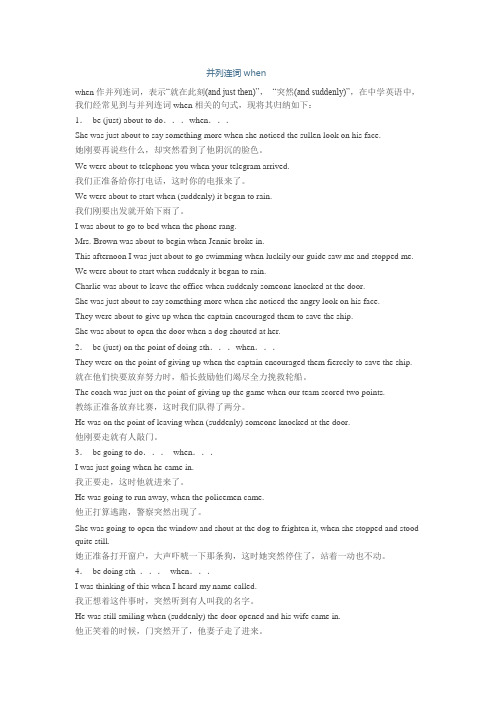
并列连词whenwhen作并列连词,表示“就在此刻(and just then)”,“突然(and suddenly)”,在中学英语中,我们经常见到与并列连词when相关的句式,现将其归纳如下:1.be (just) about to do...when...She was just about to say something more when she noticed the sullen look on his face.她刚要再说些什么,却突然看到了他阴沉的脸色。
We were about to telephone you when your telegram arrived.我们正准备给你打电话,这时你的电报来了。
We were about to start when (suddenly) it began to rain.我们刚要出发就开始下雨了。
I was about to go to bed when the phone rang.Mrs. Brown was about to begin when Jennie broke in.This afternoon I was just about to go swimming when luckily our guide saw me and stopped me. We were about to start when suddenly it began to rain.Charlie was about to leave the office when suddenly someone knocked at the door.She was just about to say something more when she noticed the angry look on his face.They were about to give up when the captain encouraged them to save the ship.She was about to open the door when a dog shouted at her.2.be (just) on the point of doing sth...when...They were on the point of giving up when the captain encouraged them fiercely to save the ship. 就在他们快要放弃努力时,船长鼓励他们竭尽全力挽救轮船。
doing的用法总结初中(汇总5篇)

doing的用法总结初中第1篇动词不定式做宾语谓语动词+动词不定式(多数动词属于此类动词)系表结构+动词不定式glad,sorry,happy,sad,surprised,troubled等与情绪有关的形容词后常用动词不定式。
动词不定式做宾语补足语动词不定式做宾语补足语结构︰主语+谓语+宾语+动词不定式多数动词,常用的有want,get,compel,expect,ask,wouldlike,advise,urge,wish,tell,allow,permit,trouble,help,teach 等。
I told him not to give up.我叫他不要放弃。
The teacher urged his students to prepare for the exam.老师劝他的.学生准备考试。
They forced me to do things against my will.他们强迫我做违背我心意的事。
Do you want me to go there instead of you?要不要我代你到那儿去?I got him to do it.我叫他做这事。
Their help enabled me to finish the work with ease.他们帮助我,使我能够顺利地完成工作。
The father allowed (=permitted) his son to travel abroad alone.父亲答应让他的儿子单独出国旅行。
We troubled him to turn on the light.我们麻烦他打开电灯。
We needed someone to fix the tape recorder.我们需要有人来修理录音机。
注意:动词不定式做make, have, let, hear, see, feel等动词宾语的补足语,要省略“to”make/have sb. do sth.I made him do it.我叫他做这事。
中考Doing, to do, do的用法

一.Doing的用法1.动词+doing(只能加doing的动词)Like/dislike/enjoy/have fun doing喜欢做consider doing考虑做mind (sb) doing介意做imagine doing 想象做suggest doing建议做practice doing练习做finish doing结束做what about/ how about doing sth 做某事如何Thank you for doing sth. 为…感谢某人keep/go/ (on) /continue doing持续做can’t help doing情不自禁做feel like doing想要做be busy doing 忙于做某事go +doing (go shopping) 去做某事no +doing 禁止做某事be worth doing 值得做be busy doing sth 忙于做某事can’t stop doing sth 忍不住做某事spend time/money (in) doing 花费时间做某事waste time/money (in) doing浪费时间做某事have trouble/difficulty/problems/experience (in) doing 做某事有困难/有经验be /getused for doing sth = be used to do sth.被用来作某事be /get/used to doing 习惯于做某事pay attention to doing 注意做某事stick to doing sth 坚持做某事look forward to doing期望做某事be interested in doing=take an interest in doing对---感兴趣be good at doing sth= do well in doing sth.擅长作某事about: be worried about doing担忧做be embarrassed about 尴尬做be annoyed about 反感做with: be pleased with doing对做---满意prefer doing to doing宁愿—也不愿without: without doing没做from: stop sb (from) doing=prevent sb from doing=keep sb from doing(但keep sb doing使某人不停的做)by: by doing通过做二.动词+doing和to do 意义无大区别begin doing/ begin to dostart doing/ start to do开始做like doing / like to dolove doing / love to do 喜欢做三.动词+doing和to do意义不同forget doing 忘记做过某事forget to do忘记去做某事(还未做)remember doing 记得做过某事remember to do记得要去做某事(还未做)stop doing=give up doing sth 停止做某事stop to do停下来去做另一件事try /try one’s best to do尽力做try doing 尝试着去做四.动词+to doagree to do同意做want to do想要做would like to do想要做,愿意做decide to do决定做hope/ wish to do希望做plan to do 计划做be supposed to sth =should do sth应该做某事learn to do学会做be /make sure to sth 确定做某事offer to do 主动要求做help (to) do /help sb with sth帮着做afford to do担负得起做refuse to do拒绝做regret to do 遗憾地做dare to do敢做seem to do似乎做promise to do许诺做can’t wait to do迫不及待做pretend to do假装做used to do过去常常做have sth /nothing to do 有某事要做it’s one’s duty to do sth 做某事是某人的责任make up /change one’s mind to do sth.下定/改变某人决心做某事其他用法:疑问词+ to dowhen/where/what/how/which/whether…todo形式主语:主语+think/feel/find…it+形容词+for(中性词).+ to doit +形容词+of(褒/贬义词).+ to dotoo+形容词+to do sth =not enough to do= so thatit takes sb. some time to do sth.be sorry/lucky/ happy/glad/pleased to do很抱歉/开心幸运动词+sb.+ to doallow sb to do 允许某人做某事get sb. to do 让某人做某事ask sb. to do 让某人做某事tell sb. to do 让某人做某事want/would like sb. to do 想要做某事encourage sb. to do 鼓励某人做某事teach sb. to do 教某人做某事train sb. to do 训练某人做某事advise sb. to do 建议做人某事lead sb. to do 领导某人做某事invite sb. to do 邀请某人做某事expect sb. to do期待某人做remind sb. to do提醒某人做(但remind sb of doing使某人想起做过某事)五.动词+sb. + dosee /watch/hear/feel/notice sb do sth 看见/听见/感觉/注意某人做某事see /watch/hear/feel/notice sb doing sth 看见/听见/感觉/注意某人正在做某事其他不带to的不定式Why not do sth=why don’t do sth 为什么不做某事let sb do sth 让某人做某事make sb do sth 让某人做某事be made to do sth 被迫做某事have sb. do sth. 让某人做某事had better do最好做would rather do than do宁愿做某事而不做某事prefer to do rather than do宁愿做某事而不做某事情态动词+do动词原形will/would/can/may/might/must/should/shall+do。
whendoingsth的用法

whendoingsth的用法“When doing sth”是一个英语短语,指在做一些活动或执行项任务时。
它通常用于句子的主语或宾语位置,用来描述正在进行的动作或状态。
以下是一些关于“When doing sth”用法的示例:1. 当句子的主语是“When doing sth”时:- When cooking dinner, I always listen to music.(做晚饭时,我总是听音乐。
)- When studying, she likes to take short breaks every hour.(学习时,她喜欢每小时休息一会儿。
)- When traveling, it's important to pack light.(旅行时,轻装是很重要的。
)2. 当句子的宾语是“When doing sth”时:- He doesn't like watching TV when he's working.(他工作时不喜欢看电视。
)- They love going to the park when the weather is nice.(天气好的时候,他们喜欢去公园。
)3.在状语从句中,引导时间、原因或条件:- I always study in a quiet place when I need to concentrate.(我需要专心学习时,我总是选择一个安静的地方。
)- She listens to music when she feels stressed.(她感到压力时,她会听音乐。
)- You can borrow my bike when you want to go for a ride.(你想出去骑车的时候,可以借我的自行车。
4. “When doing sth”也可以用于表达习惯性或一般性的动作:- I often feel inspired when reading a good book.(当阅读一本好书时,我经常感到灵感。
一文教会你to do、doing、do动词的用法!
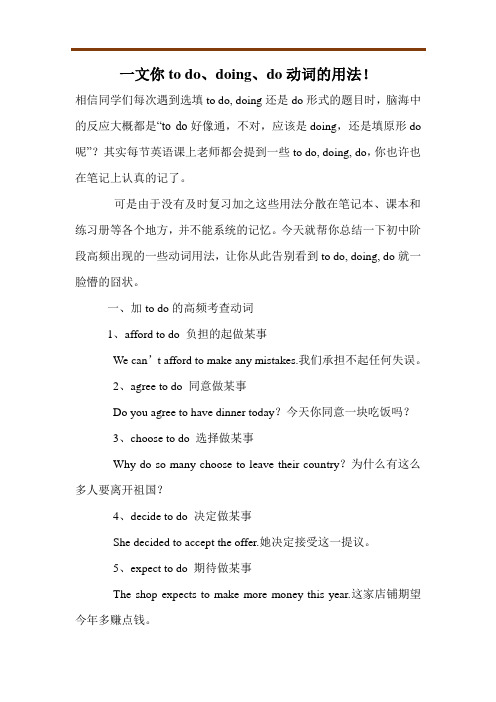
一文你to do、doing、do动词的用法!相信同学们每次遇到选填to do, doing还是do形式的题目时,脑海中的反应大概都是“to do好像通,不对,应该是doing,还是填原形do 呢”?其实每节英语课上老师都会提到一些to do, doing, do,你也许也在笔记上认真的记了。
可是由于没有及时复习加之这些用法分散在笔记本、课本和练习册等各个地方,并不能系统的记忆。
今天就帮你总结一下初中阶段高频出现的一些动词用法,让你从此告别看到to do, doing, do就一脸懵的囧状。
一、加to do的高频考查动词1、afford to do 负担的起做某事We can’t afford to make any mistakes.我们承担不起任何失误。
2、agree to do 同意做某事Do you agree to have dinner today?今天你同意一块吃饭吗?3、choose to do 选择做某事Why do so many choose to leave their country?为什么有这么多人要离开祖国?4、decide to do 决定做某事She decided to accept the offer.她决定接受这一提议。
5、expect to do 期待做某事The shop expects to make more money this year.这家店铺期望今年多赚点钱。
6、hope to do 希望做某事I hope to see you again sometime next year.我希望明年某一时候再见到你。
7、hurry to do 急忙做某事We shall have to hurry to get there in time.我们将不得不及时赶到那。
8、manage to do 设法做成某事How do you manage to do such a thing?你是怎么设法做这样的事?9、plan to do 打算做某事Where do you plan to spend your holiday?你打算去哪里度假?10、prefer to do 宁愿做某事I prefer to travel in the front of the car.我宁愿坐在汽车的前面。
Do、To do、Doing 的用法

Do/To do/Doing 的用法1.+ to do=+ doing:开始做某事begin to do/doing =start to do / doing 不喜欢dislike to do / doing 憎恨做某事hate to do/ doing喜欢做某事like / love to do / doing2.+ to do≠+ doing:忘记去做某事forget to do忘记已经做过某事forget doing记住去做某事(未做)remember to do记得已经做过某事remember doing 继续另一件事go on to do继续做原来的事go on doing 停下来去做某事stop to do 停止做某事stop doing 努力做某事try to do试着做某事try doing悔恨没做某事regret to do 后悔已做某事regret doing3.+ do帮助做某事help (to) do宁愿(不)做某事would rather (not) do最好(不)做某事had better (not) do4.+ doing:完成做某事finish doing喜欢做某事enjoy doing一直做某事keep doing练习做某事practise doing考虑做某事consider doing坚持做某事insist on / upon doing避免做某事avoid doing建议做某事suggest doing错过做某事miss doing想象做某事imagine doing介意做某事mind doing忍不住做某事can’t help doing坚持做某事keep on/ carry on doing成功做某事succeed/ be successful in doing 忙于做某事be busy (in) doing…怎么样? What /How about doing?对做某事感兴趣be interested in doing 因某事谢谢某人thank you for doing(非常)值得被…be (well) worth doing因为…because of doing而不是instead of doing(没)有做某事without/ with doing通过做某事by doing sth担心做某事worry about doing害怕做某事be afraid of doing放弃做某事give up doing做某事有麻烦have trouble / problems /difficulty (in) doing做某事开心have fun/ a good time/enjoy oneself (in) doing浪费时间做某事lose/waste time (in) doing sth 将某人的精力投入到…put one’s effort into doing 某人花费时/钱做某事sb spend +时间/钱(in) doing梦想做某事dream of/about doing5.+to do :选择做某事choose to do拒绝做某事refuse to do需要做某事need to do=require to do迫不及待做某事can’t wait to do准备做某事prepare to do=be ready to do 计划做某事plan to do决定做某事decide to do = make a decision to do = make up one’s mind(s) to do学习learn to do继续做某事continue to do付得起做某事afford to do 似乎做某事seem to do过去常常做某事used to do敢做某事dare to do梦见做某事dream to do碰巧做某事happen to do想做某事would like to do = want to do 别无选择做某事have no choice but to do 同意做某事agree to do希望做某事hope to do希望做某事wish to do不得不做某事have to do做某事失败fail to do答应做某事promise to do逐步做某事get to do更喜欢做某事prefer to do设法做某事manage to do应该做某事ought to do主动做某事offer to do尽某人最大努力做某事try/ do one’s best to do 采取措施做某事take action(s)/steps to do 等着轮到某人做某事wait for one’s turn to do轮流做某事take one’s turn to do有机会做某事have a chance to do没有时间做某事have no time to do与…比起来宁愿做某事prefer to do rather than do =would rather do than do足够…做某事enough+n.+ to do ,adj./adv.+enough+ to do为了… to do = in order to do= so as to do=for doing6.to doing :盼望做某事look forward to doing 习惯于做某事be used to doing 致力于做某事devote …to doing 与…比起来宁愿做某事prefer doing to doing 对…做出贡献make contribution(s) to doing 导致lead to donig7. sb to do :命令某人做某事order sb to do答应某人做某事promise sb to do邀请某人做某事invite sb to do警告某人(不)做某事warn sb (not) to do请求某人(不)做某事ask sb (not ) to do吩咐某人(不)做某事tell sb (not) to do想要某人(不)做某事would like sb(not) to do 需要某人做某事need /require sb (not) to do 鼓励某人做某事encourage sb to do使用某人做某事use sth to do教某人做某事teach sb to do 导致某人做某事cause sb to do训练某人做某事train sb to do建议某人做某事advise sb to do允许某人做某事allow sb to do希望某人做某事wish sb to do让某人做木事get sb to do提醒某人做某事remind sb to do拒绝某人做某事refuse sb to do迫使某人做某事force sb to do (agree sb to do是错的,hope sb to do 是错的)8.sb doing:使某人一直做某事keep sb doing sth 介意某人做某事mind sb/ sb’s doing 阻止某人做某事prevent /stop sb (from )doing = keep sb from doing 发现某人正在做某事find sb doing9.sb do/doing看见某人做某事see sb do/ doing 观看某人做某事watch sb do/ doing 听见某人做某事hear sb do/ doing 注意某人做某事notice sb do/ doing(句中有表示时点的词用doing, 有表示频度和感情的词用do)10.sb do:使某人做某事make sb do 让某人做某事let/have sb do帮助某人做某事help sb do = help sb to do11.关于to do/doing/do的句型(1)做某事花费某人…It takes /took+sb+ 时间+ to do (2)做某事对某人而言是…的It’s + adj. for sb/ of sb to do (3)做某事对某人而言是一个遗憾It’s a pity for sb to do(4)是某人第一次做某事It’s one’s first time to do(5)到了(某人)做某事的时候了。
when做并列连词的用法

w h e n做并列连词的用法 TTA standardization office【TTA 5AB- TTAK 08- TTA 2C】when 和引导时间状语从句的从属连词when 是不同的。
这主要表现在以下几个方面: 1. 位置:when 引导时间状语从句时,该从句可放在主句之前也可放在主句之后;而并列连词 when 只能位于两个分句之间,而且前面常常有逗号。
例如: Come when you please. 你高兴来就来吧。
( when 为从属连词) When I saw him, he was writing to a friend of his. 我看见他时,他在给一个朋友写信。
( when 为从属连词) I was taking a walk, when I came across him. 我正在散步,突然碰见了他。
2. 意义:when 作从属连词用时,它所引导的从句表示主句中谓语动词动作发生的时间,即作“当……时”解;而并列连词when 连接的两个分句中,第一个分句表示的是背景,第二个分句表示的是一种突然的、意想不到的情况或过早发生的事情。
when 通常含“这时突然”之义。
例如:I was thinking of this,when I heard my name called. 我正想着这件事,突然听到有人叫我的名字。
I had just fallen asleep,when the boor-bell rang. 我刚入睡,门铃突然响了起来。
这种意义在孤立的句子中可以理解到,在文章中更能体会得到。
如在“ I was wandering thro ugh the street when I caught sight of a tailor's shop ”一句中,“在街头漫步”只是“看见有家缝纫店”的时间,其后作者怎样走进缝纫店,想要什么样的衣服,怎样受到伙计的奚落,又怎样受到老板的奉承等情景均与“漫步街头”没有直接的因果关系。
when的用法总结
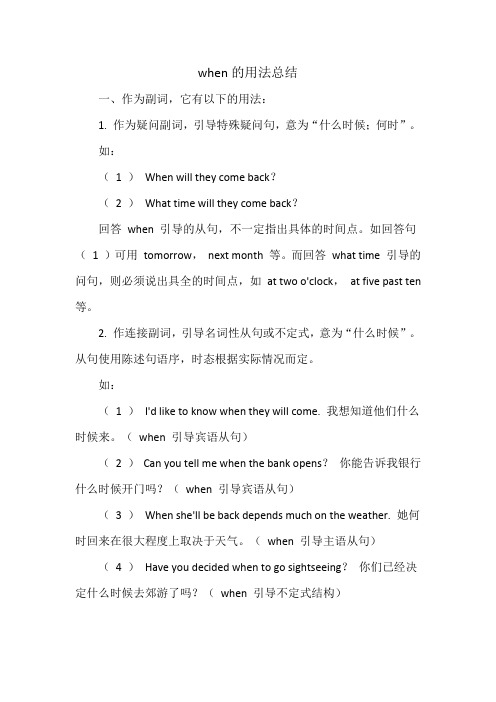
when的用法总结一、作为副词,它有以下的用法:1. 作为疑问副词,引导特殊疑问句,意为“什么时候;何时”。
如:(1 )When will they come back?(2 )What time will they come back?回答when 引导的从句,不一定指出具体的时间点。
如回答句(1 )可用tomorrow,next month 等。
而回答what time 引导的问句,则必须说出具全的时间点,如at two o'clock,at five past ten 等。
2. 作连接副词,引导名词性从句或不定式,意为“什么时候”。
从句使用陈述句语序,时态根据实际情况而定。
如:(1 )I'd like to know when they will come. 我想知道他们什么时候来。
(when 引导宾语从句)(2 )Can you tell me when the bank opens?你能告诉我银行什么时候开门吗?(when 引导宾语从句)(3 )When she'll be back depends much on the weather. 她何时回来在很大程度上取决于天气。
(when 引导主语从句)(4 )Have you decided when to go sightseeing?你们已经决定什么时候去郊游了吗?(when 引导不定式结构)3. 作疑问代词,常和介词since,till,up to 等连用,意为“什么时候”。
如:(1 )Since when have they had the house?他们从什么时候起有这幢房子的?(2 )Till when is the library open?图书馆开放到几点呢?4. 作关系副词,引导限制性定语从句和非限制性定语从句。
如:(1 )The days are gone forever when the Chinese people were looked down upon. 中国人民被人轻视的日子一去不复返了。
when和while的用法和区别

when和while的用法和区别《when 和 while 的用法和区别》在英语学习中,when 和 while 这两个词都是用来引导时间状语从句的,但它们在用法和意义上存在着一些明显的区别。
掌握这些区别对于我们正确理解和运用英语句子至关重要。
首先,让我们来看看 when 的用法。
When 既可以表示“当……时候”,也可以表示“就在这时”。
当 when 表示“当……时候”时,从句的动作和主句的动作可以是同时发生,也可以是先后发生。
例如:“When I was a child, I often playedin the park”(当我还是个孩子的时候,我经常在公园里玩。
)在这个句子中,“我是个孩子”和“在公园里玩”这两个动作是先后发生的,先成为孩子,然后才有在公园玩的经历。
再比如:“I was doing my homework when my mother came back”(当我妈妈回来的时候,我正在做作业。
)这里,“妈妈回来”和“我正在做作业”这两个动作是同时发生的。
而 when 表示“就在这时”时,常用于 be doing sth when 这个结构,意思是“正在做某事,就在这时……”。
例如:“I was walking along the street when suddenly someone called me”(我正在街上走,就在这时突然有人叫我。
)接下来,我们看看 while 的用法。
While 通常表示“在……期间;当……的时候”,强调主句的动作和从句的动作在同一时间段内同时发生,并且从句的动作通常是延续性的。
例如:“While I was reading, my sister was watching TV”(在我读书的时候,我妹妹在看电视。
)在这个句子中,“读书”和“看电视”这两个动作是同时进行的。
需要注意的是,while 引导的从句中常用进行时态,而 when 引导的从句中可以用一般时态,也可以用进行时态。
“When”作连词时的用法及译法总结
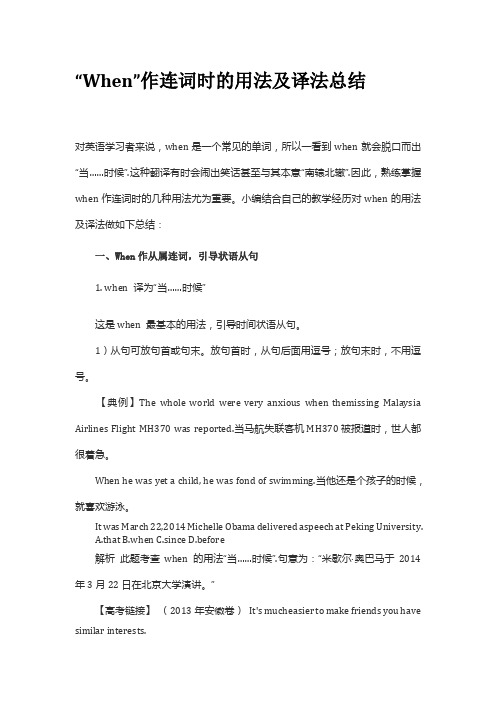
“When”作连词时的用法及译法总结对英语学习者来说,when是一个常见的单词,所以一看到when就会脱口而出“当……时候”.这种翻译有时会闹出笑话甚至与其本意“南辕北辙”.因此,熟练掌握when作连词时的几种用法尤为重要。
小编结合自己的教学经历对when的用法及译法做如下总结:一、When作从属连词,引导状语从句1. when 译为“当……时候”这是when 最基本的用法,引导时间状语从句。
1)从句可放句首或句末。
放句首时,从句后面用逗号;放句末时,不用逗号。
【典例】The whole world were very anxious when themissing Malaysia Airlines Flight MH370 was reported.当马航失联客机MH370被报道时,世人都很着急。
When he was yet a child, he was fond of swimming.当他还是个孩子的时候,就喜欢游泳。
It was March 22,2014 Michelle Obama delivered aspeech at Peking University.A.thatB.whenC.sinceD.before解析此题考查when 的用法“当……时候”.句意为:“米歇尔·奥巴马于2014年3月22日在北京大学演讲。
”【高考链接】(2013年安徽卷)It's mucheasier to make friends you have similar interests.A. unlessB. whenC. even thoughD. so that解析此题考查状语从句的连接词。
when 表时间。
句意为:“当你们有相似的兴趣时,你们会更容易成为朋友。
”所以答案是B.2)when既可引导持续性动作,又可引导短暂性动作。
它可以表示主句的动作和从句的动作同时发生,或从句的动作发生在主句动作之前。
过去进行时when和while
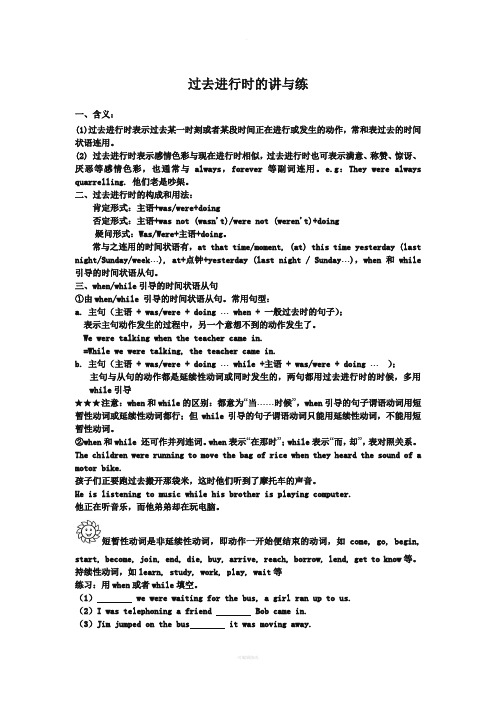
过去进行时的讲与练一、含义:(1)过去进行时表示过去某一时刻或者某段时间正在进行或发生的动作,常和表过去的时间状语连用。
(2) 过去进行时表示感情色彩与现在进行时相似,过去进行时也可表示满意、称赞、惊讶、厌恶等感情色彩,也通常与always,forever等副词连用。
e.g:They were always quarrelling. 他们老是吵架。
二、过去进行时的构成和用法:肯定形式:主语+was/were+doing否定形式:主语+was not (wasn't)/were not (weren't)+doing疑问形式:Was/Were+主语+doing。
常与之连用的时间状语有,at that time/moment, (at) this time yesterday (last night/Sunday/week…), at+点钟+yesterday (last night / Sunday…),when 和while 引导的时间状语从句。
三、when/while引导的时间状语从句①由when/while 引导的时间状语从句。
常用句型:a. 主句(主语 + was/were + doing … when + 一般过去时的句子);表示主句动作发生的过程中,另一个意想不到的动作发生了。
We were talking when the teacher came in.=While we were talking, the teacher came in.b. 主句(主语 + was/were + doing … while +主语 + was/were + doing …);主句与从句的动作都是延续性动词或同时发生的,两句都用过去进行时的时候,多用while引导★★★注意:when和while的区别:都意为“当……时候”,when引导的句子谓语动词用短暂性动词或延续性动词都行;但while引导的句子谓语动词只能用延续性动词,不能用短暂性动词。
when用法小结
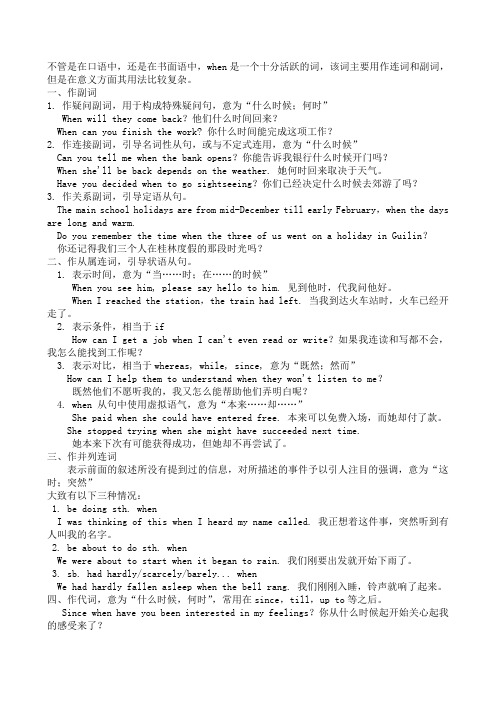
不管是在口语中,还是在书面语中,when是一个十分活跃的词,该词主要用作连词和副词,但是在意义方面其用法比较复杂。
一、作副词1. 作疑问副词,用于构成特殊疑问句,意为“什么时候;何时”When will they come back?他们什么时间回来?When can you finish the work? 你什么时间能完成这项工作?2. 作连接副词,引导名词性从句,或与不定式连用,意为“什么时候”Can you tell me when the bank opens?你能告诉我银行什么时候开门吗?When she'll be back depends on the weather. 她何时回来取决于天气。
Have you decided when to go sightseeing?你们已经决定什么时候去郊游了吗?3. 作关系副词,引导定语从句。
The main school holidays are from mid-December till early February,when the days are long and warm.Do you remember the time when the three of us went on a holiday in Guilin?你还记得我们三个人在桂林度假的那段时光吗?二、作从属连词,引导状语从句。
1. 表示时间,意为“当……时;在……的时候”When you see him, please say hello to him. 见到他时,代我问他好。
When I reached the station,the train had left. 当我到达火车站时,火车已经开走了。
2. 表示条件,相当于ifHow can I get a job when I can't even read or write?如果我连读和写都不会,我怎么能找到工作呢?3. 表示对比,相当于whereas, while, since, 意为“既然;然而”How can I help them to understand when they won't listen to me?既然他们不愿听我的,我又怎么能帮助他们弄明白呢?4. when 从句中使用虚拟语气,意为“本来……却……”She paid when she could have entered free. 本来可以免费入场,而她却付了款。
- 1、下载文档前请自行甄别文档内容的完整性,平台不提供额外的编辑、内容补充、找答案等附加服务。
- 2、"仅部分预览"的文档,不可在线预览部分如存在完整性等问题,可反馈申请退款(可完整预览的文档不适用该条件!)。
- 3、如文档侵犯您的权益,请联系客服反馈,我们会尽快为您处理(人工客服工作时间:9:00-18:30)。
When + doing"的用法
Every teacher should, therefore, follow in his footsteps and emphasize benevolence when teaching.
因此,每个老师教学时,应效法孔子并强调仁的道理。
= Every teacher should,therefore,follow in his footsteps and emphasize benevolence when he teaches .
在以when,while,if, once ,though,unless 等六个连词引导的状语从句中,若主语与主句的主语相同时,可将从句中的主语删除,并将之后的动词变成现在分词。
若是be动词,一律变成分词being,而being再予以省略。
1. when you do the work, you should be careful.
= When doing the work, you should be careful.
2. If I am free, I'll do it.
= If free, I'll do it.
3. when you do the work, you must be careful.
= When doing the work, you must be careful.
4. Though he is poor, he is happy.
= Though poor, he is happy.
5. While I was watching Tv, I fell asleep.
= While watching TV. I fell asleep.
6. When you drive a car, you should be alert.
= When driving a car, you should be alert.。
